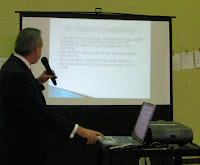We've all attended lots of presentations. Some are more memorable than others. There are sometimes issues with the sound system. The speaker's position causes feedback or the battery dies and his voice fades out. We have seen speakers fumble when the slides don't work or the embedded video plays with no sound. I've even been in conferences where the power failed and we were left sitting in the dark.
Speakers can be good, even great under all of these circumstances. Speakers who know their material can be informative and engaging without all the electronic paraphernalia. Recently during a presentation a speaker was on item seven of ten when the AV staff fouled up the slides and couldn't get them back on the big screen. After a moment or two of stalling, the speaker simply talked us through the three remaining points.
Nothing disturbs me more during a presentation than staring at the speakers back while the speaker meticulously reads each and every word from the slides. These slides are sometimes so densely packed with text a smaller font size was needed to make them fit on one page. The speaker has to read them because no one else in the room can.
This bothers me on several levels. It suggests to me the speaker does not know the material but relies instead on reading to deliver their message. Everyone in the room could read what is on the screen if the speaker has printed and distributed hard copy. But what would be the point? We didn't come here to read an article. We want you to tell us something we don't know or reinforce your major points with real life examples. Slides should be the outline, notes, key points or lists we can take away.
Often when the speaker presents to his slides you cannot even hear or understand what is being said. Presenters who read slides often mumble and trail off as they read. They give the audience the impression they can't wait to get this over and get off the stage. This is the complete opposite of engaging your audience and capturing their attention.
Finally, I am always baffled when the slides are sourced from a laptop which is in front of the speaker. If you must look at the slides, perhaps you could look at them on the screen in front of you instead of the big screen behind or off to the side. At least the audience would then see your face and might get the impression you are speaking to them. In larger venues, monitors are placed on the floor in front of the stage. Use them to view your slides instead of turning your back on the audience.
In my view, when you present, there are a few basic rules you should follow. Make sure your slides are both sparse and crisp. No more than three main points per page. Use font sizes for text and numbers on charts big enough to read from the back of the room. Know your script cold. Practice a run through the entire talk without the slides. If you can do that, you are ready to take the stage.
Captain Joe
Follow me on Twitter @JPuglisiLLC



No comments:
Post a Comment